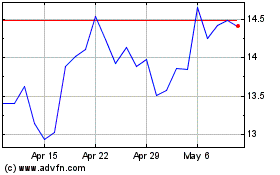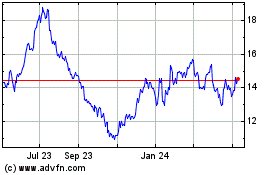By Kristina Peterson and Alison Sider
WASHINGTON -- House Speaker Nancy Pelosi (D., Calif.) signaled
Thursday she wouldn't support a stand-alone airline relief bill
without a broader coronavirus aid package, the latest twist in late
efforts to pass more economic aid before the election.
Mrs. Pelosi and Treasury Secretary Steven Mnuchin were expected
to talk Thursday about potential aid for airlines, which are
planning deep job cuts as travel spending remains depressed due to
the coronavirus pandemic.
"There is not going to be any stand-alone bill unless there is a
bigger bill and it can be part of that, or it could be in addition
to it," Mrs. Pelosi said of the airline aid, in remarks to
reporters.
Earlier this week, President Trump ended broader negotiations
between Mrs. Pelosi and Mr. Mnuchin over a multitrillion-dollar
relief package and began a push to instead pass individual relief
bills, including aid for airlines and another round of direct
checks to many U.S. households.
"I shut down talks two days ago because they weren't working
out. Now they're starting to work out," Mr. Trump said Thursday on
Fox Business Network. "We're talking about airlines, and we're
talking about a bigger deal than airlines," he said, mentioning the
$1,200 stimulus checks to taxpayers that both parties have said
they support.
Mrs. Pelosi said Thursday that Democrats were open to further
talks on a broader deal, but there were few indications that such
an agreement could be reached before Election Day.
"We are at the table. We told the White House we are at the
table. We want to continue the conversation." She said negotiators
have made some progress on possible legislative language, "so we
will see how they come back," she said, without offering further
details.
Senate Majority Leader Mitch McConnell (R., Ky.) said Thursday
he hoped to see negotiations continue, but said the impending
election was making compromise more difficult.
"We do agree another rescue package is needed. We had vast
differences about how much we should spend," he said at an event in
Kentucky. "I do believe we should continue to talk and try to get
an outcome."
Airlines are now at the center of stimulus negotiations after
months of intense lobbying for a second round of government funds
to continue paying workers. Despite bipartisan support, their
efforts so far haven't been enough to break an impasse over other
elements of a broader pandemic relief package.
Carriers began cutting tens of thousands of workers last week as
a deadline passed without any firm commitment for more government
funds, but they said they would bring workers back if Congress is
able to reach a deal. More broadly, data out Thursday show U.S.
unemployment claims remained elevated at 840,000 last week as the
labor market flashes signs of a slowdown and more layoffs become
permanent.
Democrats have generally opposed passing stand-alone bills,
saying that approach would leave out some of their priorities,
including funding for state and local governments, food-stamp
assistance and child care.
The party, however, has been willing to consider a stand-alone
airline relief bill. Last week, House Democrats attempted to pass
separate legislation to prevent tens of thousands of layoffs in the
struggling industry, but it was blocked by Republicans, who said
they hadn't had a chance to vet it. GOP lawmakers argued that the
House should have advanced a separate airlines bill with bipartisan
support.
On Wednesday evening, Mrs. Pelosi and Mr. Mnuchin spoke about
airlines aid for about 20 minutes and agreed to talk again
Thursday, according to Mrs. Pelosi's spokesman.
Last week, American Airlines Group Inc. and United Airlines
Holdings Inc. said they would go forward with a total of more than
32,000 job cuts after lawmakers were unable to agree on a broad
coronavirus-relief package.
Airlines received $25 billion in aid under the Cares Act passed
in March. A stipulation of that aid was that the carriers couldn't
lay off or furlough any workers before Oct. 1.
Airlines had hoped they would be on firmer footing by the time
that assistance ran out, but travel demand hasn't bounced back.
Passenger volume is down around 70% from a year ago, according to
Transportation Security Administration data.
The companies have warned for months that they would need to cut
staff when that date arrived unless they received another $25
billion to cover salaries and benefits through the end of March.
Carriers feared that another round of assistance would be less
likely if airline aid was the sole focus of legislation.
On Thursday morning, two Republican senators signaled concerns
with a stand-alone package for airlines, saying it was
unsustainable to continue to provide grants to maintain the
industry's payroll.
"No one wants to see layoffs, but we have a responsibility to
ensure that taxpayer resources are used in an appropriate and
equitable manner, " GOP Sens. Mike Lee of Utah and Pat Toomey of
Pennsylvania wrote in a joint statement. The two also said that a
bill should not be considered without amendments, an indication
they would likely block any efforts to pass it by unanimous
consent.
That would make consideration of a bill more time consuming,
since it would then require floor time for a debate and votes.
The Senate isn't expected to convene until the week of Oct. 19,
to give several GOP senators time to recover from Covid 19. That
leaves only two weeks before the Nov. 3 election, during which
Republicans plan to confirm Supreme Court Justice nominee Amy Coney
Barrett.
Two bills introduced last month, but not yet voted on in the
Senate or House, would extend about $25 billion to airlines,
specifying that most of the money come from unused allocations
previously approved by Congress. The legislation Democrats put
forward last week didn't include measures to repurpose existing
funds.
Before Mr. Trump's intervention Tuesday, the two sides had been
edging closer after the House passed a $2.2 trillion aid bill last
week, down from its earlier $3.5 trillion package. The Democratic
bill would provide assistance to airlines, give money to state and
local governments, send another round of stimulus checks, and
reinstate $600 weekly unemployment benefits, among other
measures.
Mr. Mnuchin had proposed a $1.6 trillion offer last week in
response. Deep disagreements remained, including how much state and
local aid to include, as well as issues including Covid-19 testing,
aides said.
--Gordon Lubold contributed to this article.
Write to Kristina Peterson at kristina.peterson@wsj.com and
Alison Sider at alison.sider@wsj.com
(END) Dow Jones Newswires
October 08, 2020 13:22 ET (17:22 GMT)
Copyright (c) 2020 Dow Jones & Company, Inc.
American Airlines (NASDAQ:AAL)
Historical Stock Chart
From Mar 2024 to Apr 2024

American Airlines (NASDAQ:AAL)
Historical Stock Chart
From Apr 2023 to Apr 2024
